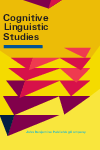
Cognitive Linguistic Studies
Scope & Guideline
Innovating Perspectives in Cognitive Science and Linguistics
Introduction
Aims and Scopes
- Cognitive Metaphor and Metonymy:
The journal emphasizes the study of metaphor and metonymy as essential cognitive tools that shape human understanding and communication. It investigates how these figurative language forms influence perception and conceptualization. - Cognitive Pragmatics:
Cognitive Linguistic Studies explores the intersection of language use and pragmatic contexts, analyzing how cognitive processes inform interpretation and meaning-making in discourse. - Cultural Conceptualizations:
The journal addresses how different cultures conceptualize experiences and values through language, focusing on cross-cultural comparisons and the impact of cultural models on cognition. - Embodied Cognition:
A significant area of focus is on how bodily experiences and sensory perceptions shape language and meaning, highlighting the embodied nature of cognition. - Application of Cognitive Linguistics:
The journal also explores practical applications of cognitive linguistic theories in areas such as language teaching, translation, and communication strategies.
Trending and Emerging
- Cognitive Approaches to Emotions:
A growing number of studies are examining the relationship between language and emotional experiences, particularly in the context of narratives and cultural expressions of emotions. - Multimodal Communication and Cognitive Linguistics:
There is an increasing focus on multimodal approaches, exploring how language interacts with other semiotic resources (such as visuals and gestures) in meaning-making processes. - Analogy and Contrast in Language:
Recent research highlights the cognitive mechanisms of analogy and contrast, suggesting their significance in understanding language structure and use. - Impact of COVID-19 on Language and Cognition:
The pandemic has prompted new inquiries into how language conceptualizes and communicates experiences related to global crises, indicating a timely response to contemporary societal challenges. - Cognitive Discourse Analysis:
Emerging interest in cognitive discourse analysis reflects a trend towards understanding how cognitive processes shape discourse and its interpretation in various contexts.
Declining or Waning
- Translation Studies:
While translation studies were previously a prominent theme, recent publications indicate a waning interest in this area, with fewer papers addressing the cognitive aspects of translation compared to earlier years. - Basic Linguistic Structures:
There has been a noticeable decrease in studies focusing on foundational linguistic structures and grammar, as the journal increasingly prioritizes cognitive and cultural dimensions of language. - Traditional Linguistic Theories:
The journal is moving away from discussions centered on traditional linguistic theories, such as Chomskyan approaches, favoring cognitive and usage-based perspectives instead.
Similar Journals
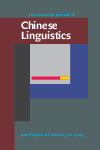
International Journal of Chinese Linguistics
Transforming Understanding of Chinese Linguistic DynamicsInternational Journal of Chinese Linguistics is a distinguished publication that delves into various aspects of linguistic studies pertaining to the Chinese language. Published by John Benjamins Publishing Co, this journal stands out for its commitment to advancing the knowledge and understanding of Chinese linguistics within the global academic community. With an impact factor that places it in the Q2 quartile of linguistics and language, the journal is indexed in prominent databases, achieving ranks of #501 in Arts and Humanities and #580 in Social Sciences. These rankings reflect the journal's dedication to maintaining high scholarly standards and its relevance in both linguistic research and practical applications. While not categorized as Open Access, the journal provides necessary access through institutional subscriptions, thereby ensuring that valuable research reaches a broad audience. Covering a wide range of topics from syntax and phonetics to sociolinguistics and applied linguistics, the International Journal of Chinese Linguistics serves as an essential resource for researchers, professionals, and students seeking to deepen their understanding of the intricate relationship between language and culture in the Chinese context. With converging years from 2019 to 2024, it continues to evolve, reflecting ongoing developments in the field.
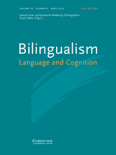
Bilingualism-Language and Cognition
Pioneering Research on Bilingualism's Impact on CognitionBilingualism-Language and Cognition, published by Cambridge University Press, is a leading journal in the fields of Education and Linguistics, renowned for its rigorous academic contributions and influential research. With an impressive impact factor placing it in the Q1 quartile of both fields, this journal ranks among the top-tier publications globally, reflecting its commitment to advancing the understanding of bilingualism and its cognitive implications. Since its inception in 2005, Bilingualism-Language and Cognition has garnered significant attention, evidenced by its remarkable Scopus rankings—11th in Language and Linguistics and 12th in Social Sciences. Dedicated to publishing high-quality original research, reviews, and integrative studies, the journal aims to foster interdisciplinary dialogue among researchers, educators, and practitioners. Although not currently an open access journal, it remains a vital resource for those engaged in bilingualism research and its cognitive dimensions, contributing to the academic landscape from its home in Cambridge, United Kingdom.

Eurasian Journal of Applied Linguistics
Connecting Scholars to Transform Language PracticesThe Eurasian Journal of Applied Linguistics, published by Hacettepe University, ELT Department, is a distinguished open-access journal that has been contributing to the fields of linguistics and language education since 2015. With a focus on bridging cultural and linguistic understandings across Eurasia, this journal provides a platform for researchers, educators, and practitioners to share cutting-edge studies, innovative pedagogical strategies, and insightful analyses. The journal holds notable Scopus rankings within the Language and Linguistics (Rank #155/1088, 85th Percentile) and Education (Rank #696/1543, 54th Percentile) categories, evidencing its growing impact within the academic community. As it prepares to converge into a new phase from 2018 to 2024, the Eurasian Journal of Applied Linguistics aims to uphold its mission of fostering interdisciplinary dialogue and advancing knowledge in applied linguistics and its related fields.
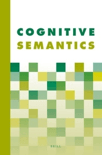
Cognitive Semantics
Advancing Understanding of Language and ThoughtCognitive Semantics, published by BRILL, is a leading academic journal dedicated to the intricate study of cognitive processes underlying language use and semantic meaning. With its ISSN 2352-6408 and E-ISSN 2352-6416, this journal contributes significantly to the fields of linguistics and language studies, reflecting its importance in contemporary research on cognitive linguistics. Over its publication span from 2015 to 2024, it has established a niche as a Q3 ranked journal in the Linguistics and Language category for 2023, showcasing its relevance and growing influence in the academic community. Although currently not open access, the journal aims to provide a robust platform for exchanging ideas, theories, and methodologies related to cognitive semantics, fostering interdisciplinary dialogue among researchers, professionals, and students. Readers can expect to uncover valuable insights into the cognitive mechanisms that shape our understanding of language, making this journal an essential resource for anyone involved in linguistic research.

Russian Journal of Linguistics
Exploring Linguistic Diversity and InnovationWelcome to the Russian Journal of Linguistics, a prestigious journal published by Peoples Friendship University of Russia that has made significant strides in the realm of linguistic studies since its inception. With an Open Access policy established in 2019, this journal provides unparalleled opportunities for researchers, professionals, and students to share and disseminate groundbreaking linguistic research. The journal is currently ranked in the Q1 category for Linguistics and Language and boasts impressive Scopus rankings, placing 129th out of 1088 in the Arts and Humanities, and 148th out of 1167 in the Social Sciences. Focusing on a diverse range of linguistics topics, the journal aims to facilitate cross-disciplinary dialogue and foster advancements in the study of language. Located in Moscow, Russia, it champions the vibrant linguistic community by consistently publishing high-quality research that contributes to the global understanding of language dynamics. We invite you to explore the wealth of knowledge and insight the Russian Journal of Linguistics has to offer.
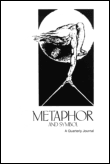
METAPHOR AND SYMBOL
Unraveling the Intricacies of Language and MeaningMETAPHOR AND SYMBOL is a prestigious journal dedicated to advancing the study of metaphor, symbolism, and their roles in communication and cognition. Published by Routledge Journals, Taylor & Francis Ltd, this journal possesses an impressive reputation, evidenced by its Q1 rankings in both Communication and Linguistics and Language, as well as a Q3 ranking in Experimental and Cognitive Psychology. As of 2023, it holds a notable position in Scopus rankings, standing in the 86th percentile for Social Sciences in Linguistics and Language, making it a vital resource for researchers and professionals interested in the intricate interplay between language and thought. With its convergence years extending from 2007 to 2024, METAPHOR AND SYMBOL aims to publish innovative research that explores the cognitive, communicative, and social aspects of metaphor and symbolism, thereby enriching the academic discourse in its field. While this journal is not open access, its contributions are invaluable to advancing knowledge and understanding in communication, psychology, and linguistics, ensuring it remains an essential read for scholars and students alike.

Cognitive Studies-Etudes Cognitives
Pioneering Open Access in Cognitive StudiesCognitive Studies-Etudes Cognitives, published by the Polish Academy of Sciences, Institute of Slavic Studies, is a prominent open-access journal based in Poland, dedicated to advancing research in the interdisciplinary fields of cognitive studies, communication, and linguistics. Since its inception, the journal has made a significant impact in the academic community, evidenced by its ranking in the Scopus database within the top 30% for Language and Linguistics. With an aim to bridge theoretical insights and practical applications, Cognitive Studies invites contributions that explore the complex interplay between language, cognition, and technology, making it a vital resource for researchers, professionals, and students alike. As the journal continues to grow, it remains committed to maintaining rigorous standards for publication while fostering an inclusive environment for innovative ideas and diverse perspectives. The journal is easily accessible and aims to facilitate knowledge dissemination, proudly offering open access since 2014.

Onomazein
Fostering Innovative Research in LinguisticsOnomazein is an esteemed academic journal published by the Pontificia Universidad Catolica de Chile, Facultad de Letras, featuring a dedicated focus on the field of Linguistics and Language. With an established presence since 2011, it reaches an international audience and is recognized for its contributions within the Q2 category of Linguistics as per the latest rankings, underscoring its significance in the academic community. The journal holds a commendable position in Scopus, ranking 470th out of 1088 in Arts and Humanities and 549th out of 1167 in Social Sciences, reflecting its relevance and impact in the domain. Although it does not currently offer an open access option, Onomazein remains a critical platform for researchers, professionals, and students seeking to advance their understanding of linguistic phenomena and engage with contemporary debates in language studies. For submissions and more information, please refer to the university’s address at AV Vicuna Mackenna 4860, Santiago, Chile.

Rivista Italiana di Filosofia del Linguaggio
Cultivating Scholarly Dialogue in Linguistic ThoughtRivista Italiana di Filosofia del Linguaggio is a prominent academic journal dedicated to the exploration of linguistic philosophy and its intersections with various fields of study, such as linguistics, cognitive science, and semiotics. Published by UNIV STUDI CALABRIA, this journal seeks to foster scholarly discourse and critical analysis by providing a platform for innovative research and theoretical perspectives. With an expectation of rigorous peer review, the journal welcomes contributions that dissect the intricate relationship between language and thought, promoting a deeper understanding of linguistic phenomena. Although Rivista Italiana di Filosofia del Linguaggio operates under a traditional subscription model, its commitment to high-quality scholarship makes it a vital resource for researchers, professionals, and students alike who are engaged in the burgeoning field of linguistic philosophy. Based in Italy, and specifically located at CAMPUS ARCAVACATA, VIA PIETRO BUCCI, ARCAVACATA DI RENDE CS 87036, this journal continues to expand its international reach by attracting contributions from diverse academic backgrounds.
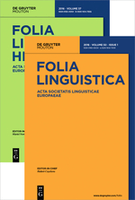
FOLIA LINGUISTICA
Advancing Linguistic Knowledge Since 1967FOLIA LINGUISTICA, published by WALTER DE GRUYTER GMBH, is a premier scholarly journal dedicated to the field of linguistics. Established in 1967, the journal has consistently provided a platform for innovative research and scholarly discourse in language and linguistics, contributing significantly to the academic community's understanding of language structures, usage, and cognitive processes. With its classification in the top quartile (Q1) of linguistics and language in 2023, FOLIA LINGUISTICA holds a respectable rank (#282/1088) within the Arts and Humanities category and an admirable percentile rank of 74th, ensuring its position at the forefront of linguistic scholarship. Researchers and academics from around the globe can access a wealth of knowledge and cutting-edge research findings through this esteemed publication, which is vital for anyone looking to engage with the latest advancements in linguistics. Located in Berlin, Germany, FOLIA LINGUISTICA encompasses all aspects of language research, making it an indispensable resource for researchers, professionals, and students alike seeking to deepen their understanding of language and its complexities.